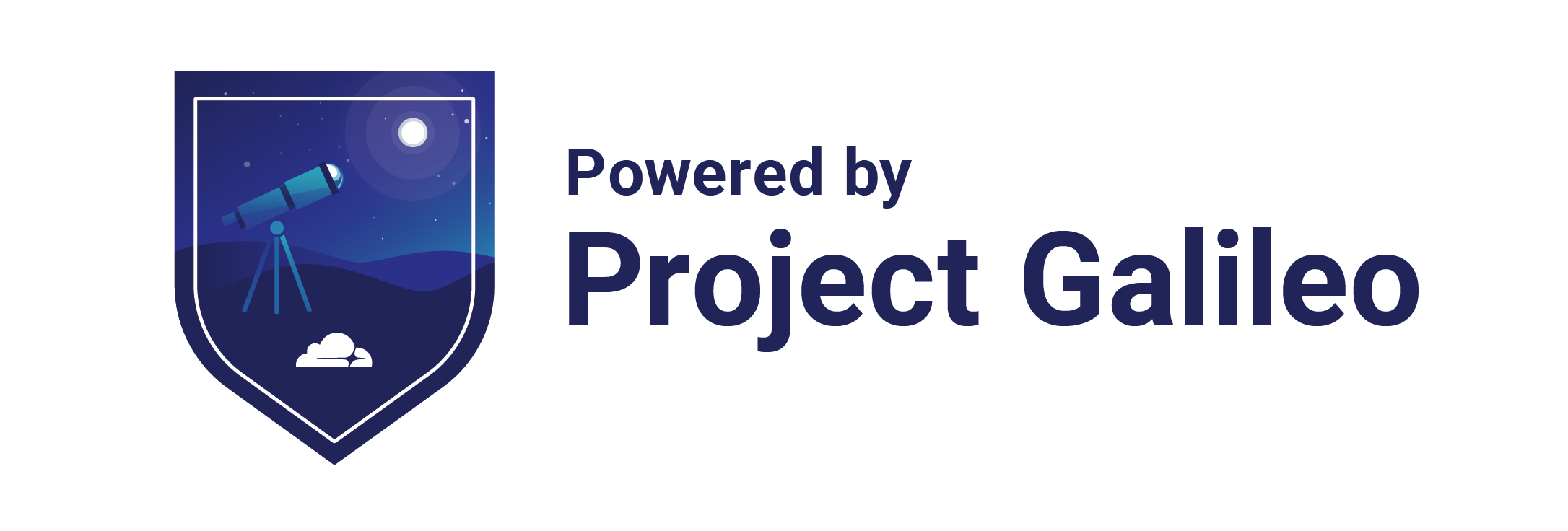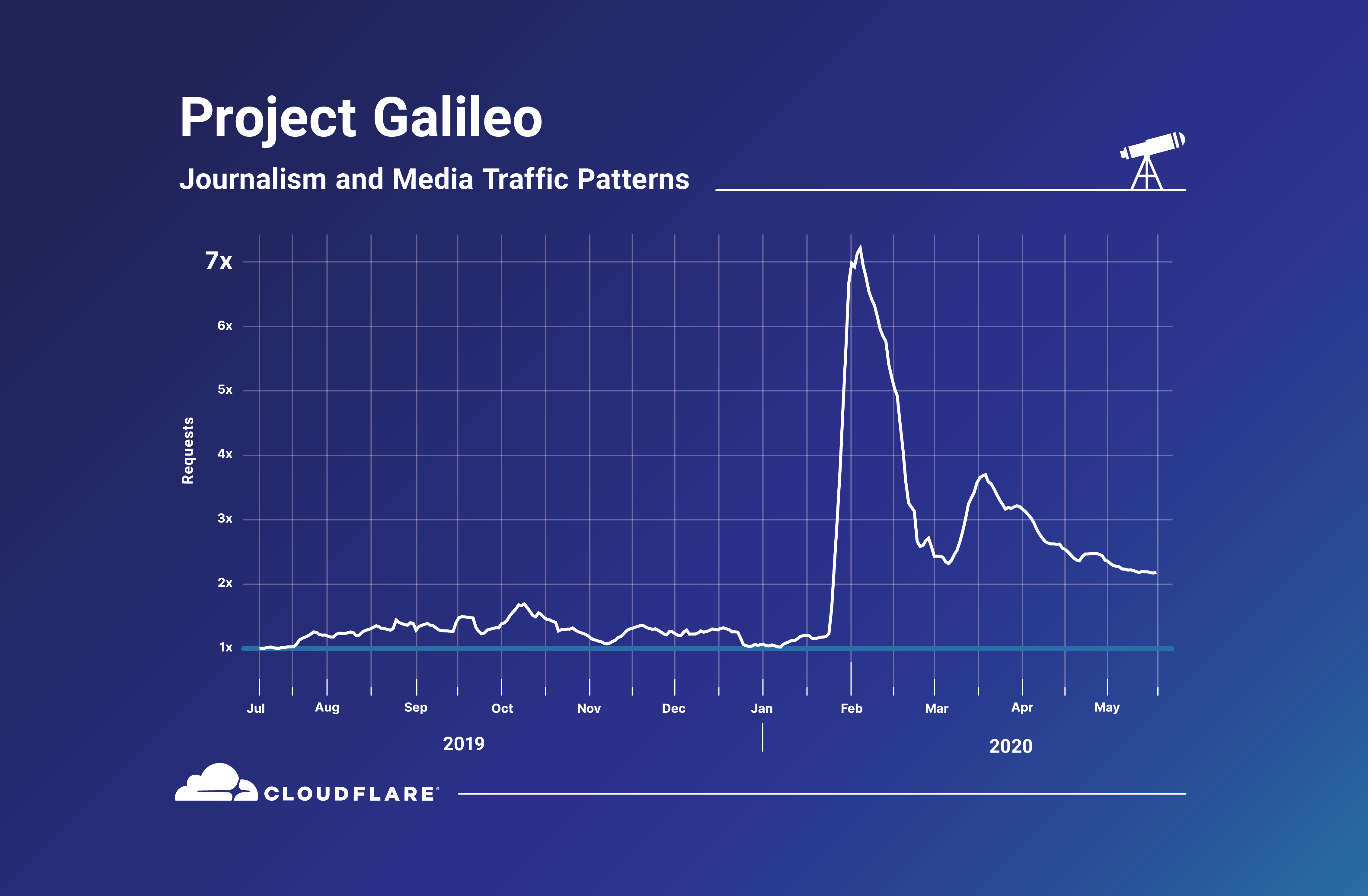 Back to Case Studies
Back to Case Studies
Location
San Francisco, CA

Cyberattacks attempting to take websites offline have become a 21st-century method of censorship. Nonprofits and public interest groups are uniquely vulnerable to such attacks but typically lack the resources and expertise to secure themselves. In 2014, Cloudflare founded Project Galileo to provide free cybersecurity protection to the most vulnerable groups on the Internet, including organizations that work in the arts, human rights, civil society, journalism, or democracy. Through ensuring that these groups will be able to stay online, Project Galileo facilitates a wide variety of critical work in the public interest.
Cyberattacks are becoming more common each year. As much of the world has been forced online due to the COVID-19 pandemic, attacks on Internet infrastructure are more concerning than ever. Denial of service attacks, in particular, are simple to perpetrate and enable attackers to take websites offline so that legitimate users cannot access them. Traffic from legitimate users can also cause a site to crash in cases where there is an abrupt increase in site visitors. For example, a journalism site publishing a story on government corruption can attract a sudden rush of millions of visitors to the website. Furthermore, the shift to remote work during the COVID-19 pandemic brought unexpected challenges. Unfortunately, many organizations struggled to enable remote access while maintaining a strong security posture, including encrypting sensitive data and ensuring secure remote access.
While any organization can be the victim of a cyberattack, public interest groups are among the most common targets but usually lack the resources to adequately prevent and respond to them. Advocacy groups promoting LGBT rights in the Middle East, political corruption trackers in Sri Lanka, independent Ukrainian journalists reporting on Russian military intervention, and many others are in vulnerable positions where they face powerful opposition to their work. Today, most governments have sufficient cyber offensive capabilities to launch attacks to take inconvenient information offline, especially in countries experienced in cyberwarfare like Russia and China.
 During the pandemic, groups organizing around racial justice and COVID-19 were able to stay online because they were protected by Project Galileo.
During the pandemic, groups organizing around racial justice and COVID-19 were able to stay online because they were protected by Project Galileo.
Cloudflare started Project Galileo in June 2014, after learning that an independent newspaper in Ukraine had come under a sophisticated denial of service attack while covering Russian military intervention in Crimea. With that, Cloudflare’s CEO was inspired to start Project Galileo.
Project Galileo provides Cloudflare’s upgraded security services for free to nonprofits and organizations acting in the public interest. Cloudflare collaborates with 41 civil society partners - including the ACLU, Amnesty International, and the Freedom of the Press Foundation - to identify organizations in need of Cloudflare’s protection. Applications to join Project Galileo are reviewed by the 41 partners. If at least one of the 41 partners supports an organization’s application, then that organization is automatically offered protection under Project Galileo.
As of April 2021, Galileo protects 1,480 domains in 100 different countries worldwide, ranging in work from human rights, environmental groups, artists, health organizations, education, and more. Examples of groups protected include Women’s March Global, Vote America, The Trevor Project, and The Water Project.
Between January and June 2020, Galileo mitigated 2.4 billion cyberattacks on Galileo participants, for an average of 17 million each day. 60% of the organizations they protect experience cyberattacks every single day. In late May, Cloudflare saw a significant uptick in cyberattacks on racial justice groups and organizations fighting racism in the wake of the death of George Floyd. Between April to May, the number of cyberattacks on such groups increased by over 1,120 times to as many as 20 thousand requests per second for a single site. These organizations were able to stay online because Project Galileo protected them.
During the COVID-19 pandemic, Project Galileo protected many websites that promoted relief efforts, including organizations that developed COVID symptom trackers, platforms for up-to-date vaccine information, mental health hotlines for those struggling in lockdown, and more. Project Galileo also started to offer services for securing remote work, including access control and products that automatically block security threats like malware and phishing attacks. In doing so, Project Galileo provided a safer, more secure environment in the rapid transition to remote work.
As world events continuously shape how public-interest organizations operate, Project Galileo works with their 41 partners to adapt so they can best support those they are protecting. Project Galileo helps the organizations stay online, secure their internal teams, and focus on their mission of helping the greater good.